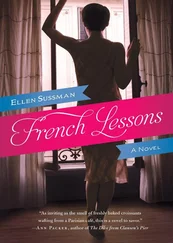1 ...6 7 8 10 11 12 ...18 “In a word,” he said “‘fashion.’”
I glanced at him, ascot askew in the collar of a rumpled Oxford shirt, brown cords, old-man shoes, a white flake on the glasses.
“Wow.”
The telephone rang.
“That will be Lydia.” He picked up a cream-colored rotary phone from a black-lacquered side table.
“Hello, my dear. Are the Huns brandishing their pickaxes yet?” He began to pace within the limits of the phone coil. “Yes, she’s fine…. Yes, Olivier appears to be gone, thank God. And he doesn’t appear to have murdered Katie or stolen or ransacked anything, although I did have to rescue a piece of your faience from the garden. He’d left one of your cups out there to the mercy of the elements. It was full of rainwater and dead leaves. Selfish twit. … As I say, Lydia, she’s fine. Why don’t you ask her yourself?” With a meaningful look at the stopped clock on the floor, he put his finger to his lips. Then he handed me the receiver.
Lydia sounded awash in happiness, but a happiness that had nothing to do with Clarence and me and everything to do with faraway events. The Wall would break soon, she said. There was monumental pressure from both sides. That was all anyone was talking about. She was getting unbelievable shots. She kept interrupting herself to say “hello” and “wonderful to see you” so that our conversation was populated by prominent German ghosts. She told me that her Paris printer would be stopping by tomorrow to introduce herself and that the two of us should have a coffee—“keep the receipt”—because we would be working together from time to time. “She does all my black and white work in Europe.” There was a loud social rumble. “Thank you!” she said away from the receiver, and I heard a clink and a cool rivulet down her throat. “Listen, I’ll call you from somewhere quieter tomorrow, but I have to know, have you told Clarence about Yale yet?”
“About Yale?”
“He can’t stand the Deconstructionists. They’re his nemesis. He’ll die when he finds out that I’ve hired a Deconstructionist from Yale to come work in the apartment. He’ll just die. He’ll moan that there’s a traitor in his midst.”
“But—”
“Just tell him. It’s a joke, sweetheart. He’s trying to be a Historicist.”
“Of course, yeah.” I giggled nervously.
“Listen, the prime minister has just arrived. I’ll call you later.”
Deconstruction was a joke? The form of literary criticism I had felt so terrible not mastering in college, hell, not even grasping, except to understand that all language pointed nowhere but back upon itself, which wasn’t very helpful. This concept that had walled me out with its jargon, these lit majors who had hurt my feelings so many times, this momentous testament to my lack of sophistication was really a gag. Here in the land of jet-set intellectuals, it was a mere farce between husband and wife. I felt my world gelling anew as if I had finally found the right prescription for a pair of glasses. So, this was the point of view of choice. Deconstruction was not glowering and intimidating. It was funny.
“What’s so amusing?” Clarence asked. He was annoyed, but not with me.
“Lydia wanted me to pretend I was a Deconstructionist because I did some literature at Yale. I was an art major, actually, but I did try some theory courses because you kind of had to in order to know what anyone was talking about. She said you would think it was funny because you’re a Historicist.”
“I hope she said I was a ‘New Historicist.’”
“I’m sure she did.”
“Probably not, but it’s not your fault. Anyway, is that her idea of a joke?”
“Well, she said the Deconstructionists were your nemesis, that I was the enemy.”
He practically spat. His trembling lips were a comical version of Portia’s gorgeous pout from the leather frame.
“Where is the woman’s sense of nuance? My nemesis indeed! She likes to pretend I’m some sort of reactionary. I am a cultural critic. I incorporate deconstruction into my work. I appreciate the text-only approach for what it meant to its time, but it’s passé, you understand.”
“Not exactly.”
Clarence explained it to me in fatherly tones. He said that it was simply the jargon that got you. Most critics should be shot. Their writing was rubbish.
“Can you believe that Derrida was the first photo in Lydia’s last book?” he asked. “You must have seen it. A travesty. I nearly convinced her not to do it, but you’ll learn how stubborn she can be. Anyway, I can help you sift through the jargon if you’re interested. Then you’ll see how easy it is to move beyond it.”
My perspective adjusted again. So, deconstruction wasn’t a joke exactly. Instead, it was a historical phase that I would master because this lovely professor, whose eyebrows did not frown and who did not assume I knew what hermeneutics were, was going to help me. Yet another vista to take in. There were cocktail parties where the German chancellor was giving you the inside scoop on when the Berlin Wall would come tumbling down and a room full of Monets that made your mother sigh as though she had once possessed them in her boudoir. There was faience abandoned in a secret garden, chestnut croissants at Hédiard.
The doorbell rang. Clarence jumped out of his seat, then sank back.
“Who could possibly be here now? Are you expecting anyone?”
I shook my head.
“Shall we go see?”
We were just intimate enough by now for me to know perfectly well that he knew perfectly well who was at the door.
“Are you sure these people aren’t exploiting you?”
“Mom, it’s a different world here. Things don’t work like that. It’s not like I’m punching a time clock and they aren’t paying me for my overtime. It’s a full situation I’ve moved into. You should see this place. I’m in the heart of Paris, Mom. Henri Cartier-Bresson stopped in yesterday for tea. This world-famous old man just dropped by the house. He’s a friend of Lydia and Clarence’s. Apparently, Lydia has already mentioned me to him. She told him I was an artist in the making. He asked about my work because he’s started to draw as a second career. He said he likes the exertion. He’s questing, Mom, at his age, and doing something he’ll never be nearly as famous for only because it’s interesting. He looked at my Paris sketchbook and said my work was beautiful, almost without flaws, he said. People like this are talking to me. They like me.”
“I’m sure they do. What’s not to like? All I’m saying is that you’re paying a ridiculous amount for one room and you have almost no salary and you’re transcribing notes for the husband and running errands at all hours. You have to learn to protect yourself. I don’t want you to get to a year from now and feel like you’ve wasted your time.”
“It’s not wasting time. It’s experience. This is what experience is. I’ve only been here a couple of weeks and I’ve already learned so much.”
“I’m telling you, if you’re not careful, you’ll be a dog-walker before you know it.”
“The dog isn’t even here yet. Clarence is getting him from the country tomorrow. He’s been boarding at some farm in Normandy. Nice, huh?”
“You mean there is a dog? I was kidding, darling. It was a manner of speaking. Listen, if this Lydia person says that her fancy magazines can only pay you so much, then she asks you to walk her dog, she should supplement your salary. And if you end up working for her husband, then he should pay you too.”
“Mom, you’re being cynical. These people aren’t petty. I’m telling you, it’s not a tit-for-tat world. They feed me and it’s not like they send me bills. Clarence and his friends even take me out to eat with them sometimes, and I know Lydia will too when she gets here. She already said there are all these places in the neighborhood where we’ll be regulars. I could never afford that if it was just me working in an office. And it won’t be so bad to walk a dog in Paris, anyway. I can take him to the Luxembourg.”
Читать дальше












